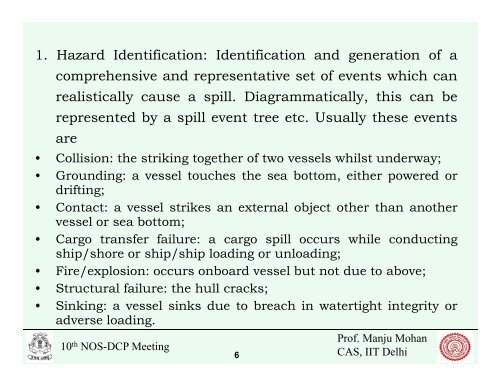Environment Risk Analysis - Indian Coast Guard
Environment Risk Analysis - Indian Coast Guard Environment Risk Analysis - Indian Coast Guard
1. Hazard Identification: Identification and generation of a comprehensive and representative set of events which can realistically cause a spill. Diagrammatically, this can be represented by a spill event tree etc. Usually these events are • Collision: the striking together of two vessels whilst underway; • Grounding: a vessel touches the sea bottom, either powered or drifting; • Contact: a vessel strikes an external object other than another vessel or sea bottom; • Cargo transfer failure: a cargo spill occurs while conducting ship/shore or ship/ship loading or unloading; • Fire/explosion: occurs onboard vessel but not due to above; • Structural failure: the hull cracks; • Sinking: a vessel sinks due to breach in watertight integrity or adverse loading. 10 th NOS-DCP Meeting 6 Prof. Manju Mohan CAS, IIT Delhi
2. Frequency Analysis i.e. Assessment of oil release probability. Mostly, this is estimated by combination of component probabilities derived on basis of reliability data (if available) and statistical analysis of historical data. Other sources of frequency analysis are – Data and Statistics – Expert Advice – Historical Records – Ground Truthing – Consultation – Individual Experience 10 th NOS-DCP Meeting 7 Prof. Manju Mohan CAS, IIT Delhi
- Page 1 and 2: THE TENTH NATIONAL OIL SPILL DISAST
- Page 3 and 4: MAJOR OIL SPILL INCIDENTS Year Plac
- Page 5: Stages of Risk Analysis Hazard Iden
- Page 9 and 10: 4. Risk Calculation: Broadly risk c
- Page 11 and 12: CASE STUDIES 10 th NOS-DCP Meeting
- Page 13 and 14: Background of the Analysis • Cret
- Page 15 and 16: Map of Crete 10 th NOS-DCP Meeting
- Page 17 and 18: • As per priorities of significan
- Page 19 and 20: • The combined Risk Units for eac
- Page 21 and 22: Results from Crete Oil Spill Risk A
- Page 23 and 24: Risk Combination for Tourist zones,
- Page 25 and 26: METHODOLOGY OVERVIEW • Hazard ide
- Page 27 and 28: Location of Gulf of Mexico Counties
- Page 29 and 30: • At about 11 km intervals in the
- Page 31 and 32: • The model counts the occurrence
- Page 33 and 34: Results from GoM Oil Spill Risk Ana
- Page 35 and 36: 10 th NOS-DCP Meeting 35 Prof. Manj
- Page 37 and 38: • The remotely sensed data as spa
- Page 39 and 40: • The GIS based system can be use
- Page 41 and 42: CONCLUSIONS • A schematic risk as
1. Hazard Identification: Identification and generation of a<br />
comprehensive and representative set of events which can<br />
realistically cause a spill. Diagrammatically, this can be<br />
represented by a spill event tree etc. Usually these events<br />
are<br />
• Collision: the striking together of two vessels whilst underway;<br />
• Grounding: a vessel touches the sea bottom, either powered or<br />
drifting;<br />
• Contact: a vessel strikes an external object other than another<br />
vessel or sea bottom;<br />
• Cargo transfer failure: a cargo spill occurs while conducting<br />
ship/shore or ship/ship loading or unloading;<br />
• Fire/explosion: occurs onboard vessel but not due to above;<br />
• Structural failure: the hull cracks;<br />
• Sinking: a vessel sinks due to breach in watertight integrity or<br />
adverse loading.<br />
10 th NOS-DCP Meeting<br />
6<br />
Prof. Manju Mohan<br />
CAS, IIT Delhi



